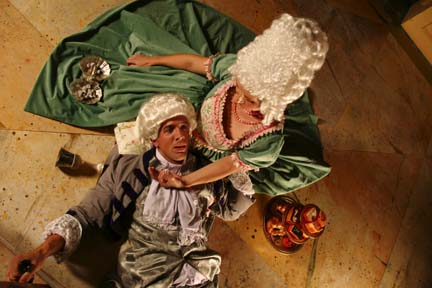
[ ON STAGE ]
COURTESY OF BRAD GODA
Todd Evans as Wolfgang Amadeus Mozart and Clara Chorley as Constanze Weber in a scene from Diamond Head Theatre's production of "Amadeus.".
Palmore excels as
nemesis of Mozart
Did Antonio Salieri poison Wolfgang Amadeus Mozart or, at the least, mastermind the events that drove Mozart to self-destruct at age 35? It's impossible to say for sure 213 years after Mozart's death, although playwright Peter Shaffer put his own elaborate spin on history when "Amadeus" premiered in 1979. What Honolulu theater fans can take as fact in 2004 is that Diamond Head Theatre's current revival is a stark and powerful staging of Shaffer's tale of arrogance, jealousy and evil.
Paul D. Palmore carries the show with an outstanding performance as Salieri, who, as the play opens, is preparing to commit suicide. The year is 1823 and Salieri, old and somewhat repentant, asks the "ghosts of the future" to hear his account of how and why he had outwitted and then destroyed Mozart 32 years before.
"Amadeus": Presented by Diamond Head Theatre, continues 8 p.m. Thursdays through Saturdays, and 4 p.m. Sundays through Feb. 22. Tickets $12 to $42. Call 733-0274.
Salieri was court composer to Emperor Joseph II in Vienna, Austria. Mozart, a former child prodigy, arrived on the scene in 1781, a highly touted composer and performer, but also loud, boorish and insufferably crude -- at least as Salieri tells it.
But more troubling to Salieri is that he hears in Mozart's work a talent far superior to his own. Salieri explains that as a teenager he had asked God to give him the talent to compose great music and promised in return to spend his life writing music to glorify Him. All seemed well until Mozart arrived; Salieri enjoyed acclaim and financial success, and kept his promise by composing uplifting music, leading a moral life and using his position at court to help other composers and musicians. Then came Mozart, a crude, promiscuous jerk whom God had blessed with far more talent.
Salieri decided to take revenge on God by destroying Mozart.
The role is a demanding one, and Palmore successfully meets the challenges. A few seconds and a quick costume change are all it takes to make the physical transition from the aged Salieri of 1823 to the towering, powerful Salieri of the 1780s. Palmore also accomplishes the essential task of making Salieri more than a two-dimensional villain. His destruction of Mozart seems driven as much by compulsion as by professional jealousy, but Palmore takes care not to let us sympathize with Salieri too much.
Todd Evans (Mozart) doesn't hit the same extremes of manic obnoxiousness Tom Hulce achieved opposite F. Murray Abraham in the 1984 film version, but gives a worthy performance in both halves of his role. Evans combines gangly callowness with an eager-to-please puppy dog charm in the early scenes and thereby keeps Mozart from being completely unlikable. He touches the heart in final tragic scenes playing Mozart as a broken and terrified man working feverishly to complete the requiem Mass that he realizes will be his own.
Theater veterans Richard Aadland (Baron Van Swieten), John Mussack (Count Von Strack) and Dennis Proulx (Count Orsini-Rosenberg) give solid performances as the conservative guardians of morality who found Mozart almost as objectionable as Salieri did. Proulx plays the broadest and most snobbish of the three with a light hand and a fine touch.
Maybe it was the general mood of doom and tragedy on opening night, but Mark Miller's work as the shallow and superficial Emperor Joseph II didn't generate the laughs one might expect from the most consistently comical character in the show. (Salieri recalls Joseph as a royal airhead whose response to one of Mozart's perfect compositions is that it has "too many notes.") Joseph's ultimate bon mot for any unpleasant situation -- "Well, there it is" -- didn't connect as a punch line with the sparse crowd on opening night.
Clara Chorley (Constanze Weber Mozart) plays Constanze as a woman who matures faster than Mozart but is not shrewd enough to save him from himself and from Salieri. Constanze stands by her man despite his humiliating treatment of her when he is riding high, and doesn't desert him when his career has crumbled.
Brian Gilhooly (Venticelli 1) and Jared Jeffries (Venticelli 2) add to the tone of cynicism and gloom as the informants who gleefully keep Salieri informed of Mozart's ups and downs.
Sound has rarely been more important in a nonmusical play than in "Amadeus." Director Bill Ogilvie uses music tracks to give the audience a sense of what Mozart and Salieri were writing or listening to. Mikel J. Humerickhouse (sound design) does such a perfect job that DHT's "Amadeus" may inspire some to look for a copy of the 1984 film soundtrack.
Students of history know that neither the play nor the film was intended to be a factual documentary of the lives of Mozart and Salieri, and that many of the elements of character and action that make "Amadeus" such great theater are based at best on wild speculation and invention. Salieri was definitely not a mediocre composer, while Mozart apparently indulged in "toilet humor" only among close friends, and is not known to have been unfaithful to Constanze even though open adulterous affairs were widely accepted at the time.
Furthermore, it appears that Mozart and Salieri were never close enough for Salieri to have been a position to give Mozart bad advice, let alone poison him or finally reveal himself as Mozart's mortal enemy.
Click for online
calendars and events.

